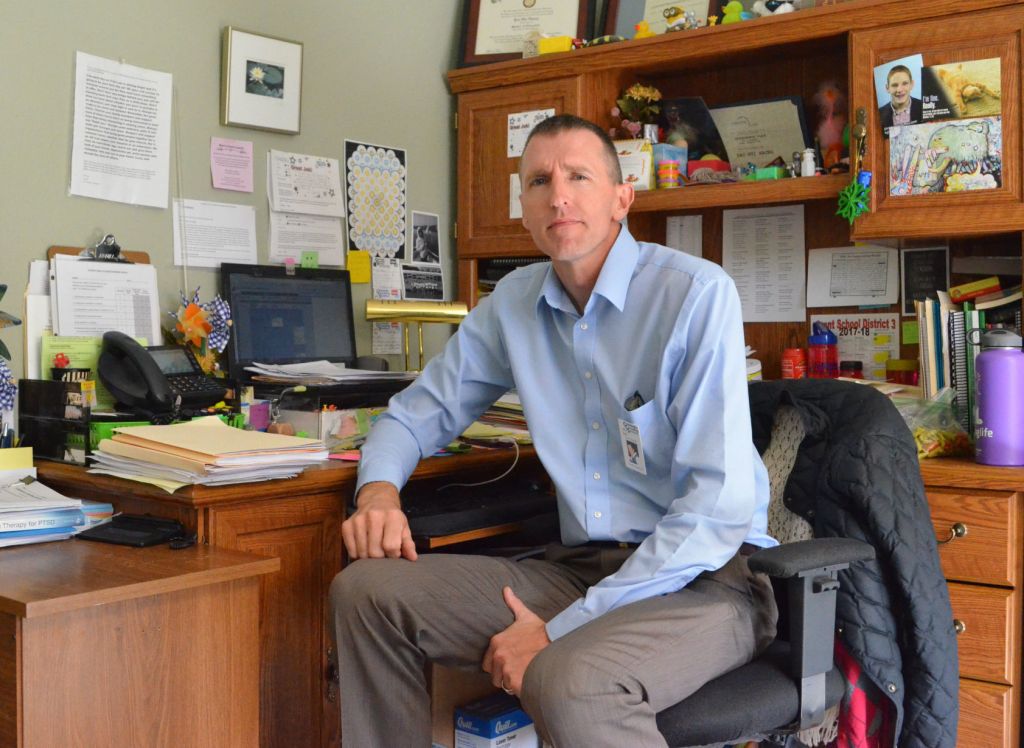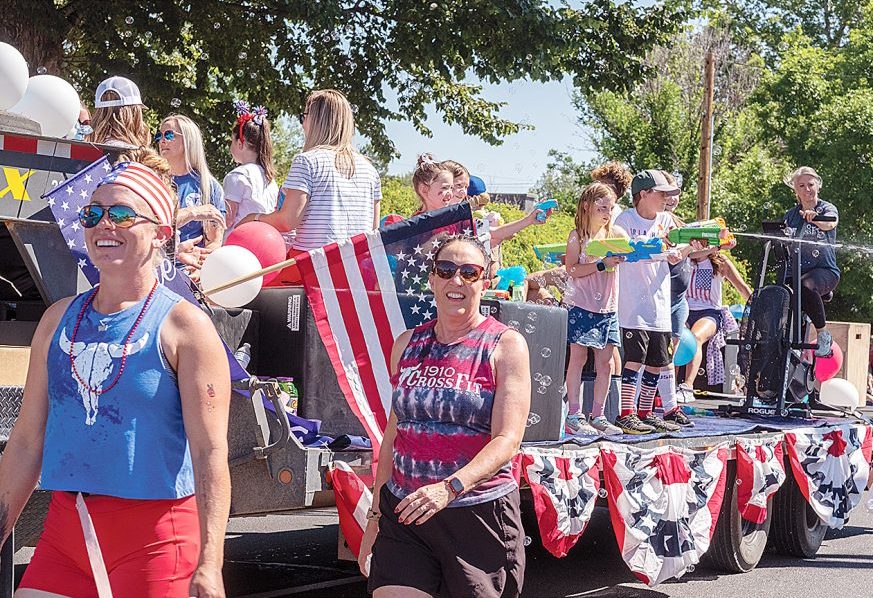Drug treatment ‘deflection’ efforts up and running
Published 5:00 am Wednesday, September 18, 2024

- Community Counseling Solutions Clinical Director Thad Labhart sits at his desk in 2020. CCS is helping to launch Grant County's new deflection program for low-level drug possession cases.
BAKER CITY — If Baker County wasn’t the first of Oregon’s 36 counties to use a new state law intended to encourage people to get treatment for drug addiction, it must have been close.
The new law that authorizes counties to employ “deflection programs” took effect Sept. 1.
That day was little more than half over when a police officer for the first time offered the program to a person who had a relatively small amount of an illegal drug.
The person, who was found with what was suspected to be methamphetamine and fentanyl, accepted the offer, said Gabe Maldonado of the Baker County Sheriff’s Office.
Maldonado is coordinating the county’s deflection program.
He said the offer Sheriff’s Deputy Bo Hansen made Sept. 1 is the first Maldonado has documented.
The incident report on the police log doesn’t list the person’s name or any other details.
People who accept a deflection offer and then complete the recommended treatment program will not be charged with a crime, so the incident will not be on their record.
Created under the auspices of House Bill 4002, which the Oregon Legislature passed in February and Gov. Tina Kotek signed into law, deflection programs give people cited for possession of relatively small amounts of certain drugs a chance to avoid criminal charges if they complete addiction treatment.
People who are charged with other crimes, as well as drug possession, or who are on probation, are not eligible for deflection.
The new law reverses the centerpiece of Ballot Measure 110, which Oregon voters passed in November 2020. That measure decriminalized possession of small amounts of drugs, including fentanyl, methamphetamine, cocaine and heroin, making possession a violation.
(A majority of Baker County voters opposed the measure, 62.3% to 37.7%).
How deflection works
When a police officer finds a person in possession of an illegal drug, and the amount is below the thresholds in the law and there is no other potential crime (such as drug trafficking), the officer can give the person a chance to enter the deflection program.
The thresholds include less than one gram of heroin or fentanyl (or five or fewer “user-units,” such as pills), less than two grams of methamphetamine or cocaine, fewer than 40 user-units of LSD, and less than 12 grams of psilocybin.
Maldonado said in the Sept. 1 incident, Hansen stopped the person for a traffic violation. Hansen had probable cause to request a consent search, which revealed the drugs as well as drug paraphernalia, Maldonado said.
When the person accepted the deflection offer, Hansen provided a form similar to a traffic citation. The form requires the person to go to New Directions Northwest in Baker City within three business days for a treatment assessment.
Employees at New Directions will recommend a treatment program.
If the person fails to show up at New Directions at the time Hansen included on the form, or if the person fails to complete treatment, then Hansen’s original report will be forwarded to the district attorney’s office for criminal charges.
(That would also happen if the person rejects the police officer’s offer to enter the deflection program.)
Possession of small amounts of drugs is an unclassified misdemeanor, with a potential penalty of 180 days in jail.
If the person finishes the treatment, no criminal charges would be filed and the matter would be closed, Maldonado said.
District Attorney Greg Baxter said he hopes the deflection program will encourage people to finish addiction treatment who otherwise would not.
Maldonado agreed.
Referring to the first person offered deflection, he said he hopes the person “makes the most of it and it’s a positive outcome.”
“There is definitely a fentanyl issue in our county,” Maldonado said. “This gives people a chance to improve their lives.”
Union County approach: ‘deferred prosecution’
As Union County officials looked at the drug-deflection programs other counties were establishing, many of them didn’t seem like a good fit for a variety of reasons, including its large geographic area and resource limitations.
“Each of the 36 counties in the state of Oregon is very different in terms of what we have in terms of resources and ability to provide the services that would be necessary in order to have a deflection program,” La Grande Police Chief Gary Bell said.
Union County does not have a sobering center, detox facility or readily available inpatient drug treatment facilities. So Union County is taking a different approach, a program District Attorney Kelsie McDaniel called “deferred prosecution.”
McDaniel said Union County’s deferred prosecution program will help people who started using drugs following the 2020 passage of Measure 110.
Union County’s program has strict criteria for who can qualify for deferred prosecution and McDaniel does not anticipate there will be large numbers of people going through the program.
There have been a few citations for possession since the law went into effect Sept. 1, she said, and as of Sept. 9 none of the people cited had qualified for deferred prosecution.
To be eligible for deferred prosecution the defendant must live in Union County. They cannot be facing any other accompanying charges, and they cannot have any outstanding warrants.
Defendants additionally must not be on formal probation, post-prison supervision or parole; have a criminal history of distribution, manufacturing or possession of substantial quantities of a controlled substance; or have a history of violent felonies, child abuse or sexual offenses within the last 10 years.
When an officer cites someone for possession of a controlled substance, a copy of the citation will be shared with the district attorney’s office. If the cited individual is eligible for the program, they will meet with defense attorney Logan Joseph. McDaniel said she wanted to involve legal counsel for the individuals to ensure they know their rights and understand the options being presented to them.
If the person chooses to go into the deferred prosecution program, they will undergo an assessment to determine their level of care and needs, so a treatment plan can be created. McDaniel said if a defendant successfully completes the treatment plan, the possession charge will be expunged.
Umatilla County program begins Oct. 1
While Morrow County District Attorney Justin Nelson said his county remains up in the air about how to address the new state law allowing counties to set up deflection programs, Umatilla County is preparing to get its program put in place by Oct. 1.
According to the Oregon Behavioral Health Deflection Grant Program application update, Umatilla County received $349,706 from the Oregon Criminal Justice Commission and Morrow County received $149,998 to build their programs.
Mark Royal is the former director of Umatilla County Community Corrections and now the county’s deflection program coordinator. He is banding with Community Counseling Solutions and law enforcement agencies on laying out the deflection plan.
Royal said when an officer gives a person a citation for possession of a controlled substance, he will be notified along with a peer navigator/mentor and a case manager to consult with the individual on the guidelines of the program.
“Then the individual makes some decision if they want to participate or not,” Royal said. “And then are entered in some kind of treatment service indicated by a screening assessment.”
Royal said a person usually has six weeks to appear in court following a citation.
According to the Umatilla County Deflection Protocols packet, a successful completion of the program would require an individual to have demonstrated engagement in any recommended substance abuse disorder or other recommended treatment for a period of 120 consecutive days. The program measures this in feedback from the treatment provider, treatment records, urine analysis and more.
A person would be removed from the program if they are charged with other crimes, they fail to appear for a court date or they aren’t sufficiently engaged in the program.
Royal said court appearances for the citation will be in Pendleton rather than Hermiston until further changes have been made.
Grant County’s approach ‘pretty typical’
Grant County’s deflection program will go into effect in December, said Thad Labhart, clinical director of Community Counseling Solutions, which is running the program in consultation with county officials.
Labhart said the program “is pretty typical” of the approach taken by most Oregon counties.
People cited for possession of small amounts of drugs can avoid criminal charges by going into deflection, as long as they meet the program’s conditions. For the most part, that means they can’t have any additional charges pending besides simple drug possession, can’t be on probation already, and can’t have any convictions for sex crimes or violent offenses.
People who qualify for deflection must also follow through with the program designed by their CCS counselor to avoid prosecution and a possible criminal record.
“If they engage in that treatment regimen for at least four months, continuously, that charge essentially disappears,” Labhart said.
“If they don’t, if they drop out, their court date will continue and they will go before a judge on the original charge.”
Labhart said Grant County has received $150,000 in seed money from the state to get its deflection program up and running and may qualify for additional funding in the future.
CCS plans to hire a part-time peer navigator to connect with people choosing deflection to schedule an initial appointment with a substance use disorder counselor, who will do a formal assessment and design an individualized treatment program.
The navigator can also screen deflection candidates to see if they qualify for employment services, help with housing assistance, food assistance and other benefits that can help them succeed in drug treatment.
In addition, Labhart said, CCS is creating two regional positions to support local deflection programs in the counties where it operates.
Wallowa County opts against a deflection program
WALLOWA COUNTY — While most of the state’s other counties are launching some form of deflection program intended to move drug users into treatment and away from the court system, Wallowa County is holding off for the time being.
“Wallowa County is not doing a deflection program at this time,” District Attorney Rebecca Frolander said in an email. “We do not have the resources, infrastructure or manpower to implement such a program.”
“We all think that a deflection program is an awesome idea in theory, OK?” Frolander said in an earlier interview.
Wallowa County doesn’t have a detox facility and the money that was available to the county to start a deflection program — $150,000 — was not adequate for the county even to hire the needed supervisors.
So in Wallowa County, individuals charged with misdemeanor drug possession will be issued a citation to appear in court.
Frolander said county officials are planning an early disposition program, in which qualifying individuals would be offered the option of resolving their case at the time of arraignment. If they choose that option, they would enter into a judgment of conditional discharge, go on supervised probation, and complete alcohol or drug treatment along with any other probation requirements.
If successful, defendants would have their case dismissed and their records sealed.
If unsuccessful, they would proceed through the court system. If found guilty, they would go back on supervised probation — which likely would include a requirement to complete drug and alcohol treatment. If they’re successful then, they could again qualify to have their record sealed. If they’re unsuccessful, their probation would be revoked, and they could be sentenced to a jail term of up to 180 days.
“There is definitely a fentanyl issue in our county. This gives people a chance to improve their lives.”
{p style=”text-align: right;”}— Gabe Maldonado, coordinator of Baker County’s new drug treatment deflection program






